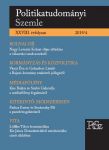Ellenzékiség, aktorok és a demokrácia nyitott kimenetele. Az 1990 utáni Magyarország példája
Forms of opposition, actors and open-ended democracy. The case of post-1990 Hungary
Author(s): Ervin CsizmadiaSubject(s): History and theory of political science
Published by: MTA Politikai Tudományi Intézete
Keywords: Opposition; political actors; open-ended transition; political dynamics
Summary/Abstract: In the thirty years since the change of regime in Hungary there have been at least three forms of opposition politics (“simple” or “as usual” anti-government opposition, anti-system opposition, and resistance, plus various combinations of these), and we cannot say that – as would be expected – anti-government opposition, which is seen as the norm in consolidated democracies, has solidified. Relatively little attention has been paid by the literature to identifying these forms of opposition and describing their dynamics and character. Specifially looking at the Hungarian example, the article primarily approaches the topic from the standpoint of the political actors and does not pay as much attention to the equally important structural factors or economic and social conditions. The author relates to the literature that emphasizes the intentions and actions of the actors during the transition. The main explanatory principle is the open-ended transition and democratization, which means that contrary to the more closed and teleological democracy theories, the political actors in the thirty years of the Hungarian transition have struggled with each other in an open-ended way, thus a pre-written, textbook version of democratization could not come about.
Journal: Politikatudományi Szemle
- Issue Year: XXVIII/2019
- Issue No: 4
- Page Range: 89-116
- Page Count: 28
- Language: Hungarian

